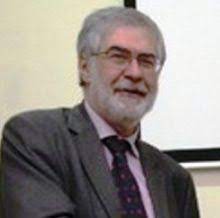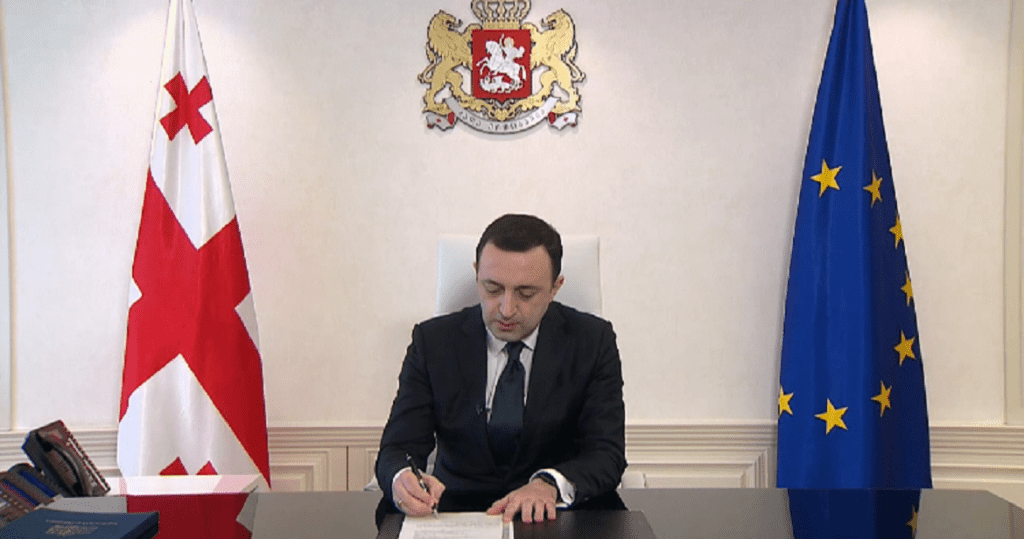World Geostrategic Insights interview with Ghia Nodia on Georgia’s chances of becoming an official candidate for EU membership, its balancing with NATO, and prospects for Georgia-Russia relations.

Ghia Nodia is professor of politics in Ilia State University in Tbilisi, Georgia. He is also a founder and chairman of the Caucasus Institute for Peace, Democracy and Development (CIPDD), an independent public policy think tank in Tbilisi. In February–December 2008, he served as the minister for education and science of Georgia.
Q1 – Plans to join the EU, as well as NATO, are enshrined in Georgia’s constitution and, according to polls and street demonstrations, are supported by a large part of the population. Georgia formally applied for EU membership along with Ukraine and Moldova, just days after Russia on Feb. 24 invaded Ukraine. On June 23, EU leaders granted formal candidate status to Kyiv and Chisinau but, while recognizing Georgia’s European perspective, they decided Tbilisi could become an official candidate only after implementing a set of reforms by the end of 2022. The conditions set by the EU include an end to political polarization, improvement of press freedom and the state of the courts, electoral reforms, and “de-oligarchization.” What are the underlying reasons for this EU decision? Do you think the current Georgian government is really willing and able to meet these conditions?
A1 – In the last 2-3 years, and especially since the beginning of Russia’s war against Ukraine, policies of the Georgian Dream (GD) government towards the EU and the West, in general, have become contradictory bordering on schizophrenic. The government insists it remains loyal to the pro-western course (that is, aspirations to NATO and EU integration), but the substance of its policy as well as most of its public rhetoric runs counter to this aspiration. This expresses itself in an increasing trend of harassing the opposition, media, and civil society, refusing to recognize and address glaring democracy deficits such as unfair electoral environment and lack of judiciary independence, spreading absurd anti-western conspiracy theories alleging that the US and EU are in collusion to drag Georgia into the war or stage a revolution. Despite formally condemning Russia’s aggression, the GD speakers attack Ukrainian leaders much more frequently than they criticize Putin.
Against this backdrop, it was not surprising that the EU decided not to grant candidate status to Georgia, unlike Moldova and Ukraine. For years, Georgia was considered a relatively successful country within the Association Trio; it was an obvious leader in some areas such as fighting corruption. But granting Georgia an EU candidate status in a moment when it is consistently backtracking on democracy and its government’s visions increasingly diverge from that of the EU would be illogical. Under the circumstances, the recognition of Georgia’s European perspective and a chance to revisit the status decision if the EU’s specific recommendations are met was probably the best Georgia could hope for.
While the GD government has signaled its readiness to meet the EU recommendations, most commentators are skeptical it is ready to treat them substantively: this would imply a 180 grades reversal of its policies. We can see this if we consider the two most controversial EU recommendations: “deoligarchization” and ending political polarization. The only person who has been called an “oligarch” in Georgia is Bidzina Ivanishvili, the founder of the GD and its first prime minister, who resigned in 2013 but is widely believed to exercise effective control over the country’s political direction. Respectively, “deoligarchization” could only mean the replacement of the GD government: this is the understanding shared by a large part of the opposition and civil society. GD, on the other hand, insists that “deoligarchization” has nothing to do with Ivanishvili (who claims he has nothing to do with politics anymore), and has proposed legislation that would, among other things, limit the capacity of wealthy businessmen to fund independent media. EU representatives privately acknowledge the ambiguity of the “deoligarchization” idea but refrain from its clearer definition.
As concerns “ending polarization”, the GD strategy has always been to declare the main opposition party, the United National Movement (UNM), a criminal force that should be destroyed, not just defeated in elections. Moreover, GD describes almost all its critics (even the most moderate ones) as hidden accomplices of UNM. Since the war started, GD also refers to them as the “war party” involved in the mentioned conspiracy to drag Georgia into the war. In turn, the opposition also uses radical language (typically, presenting GD as a treasonous force for its alleged linkages to Kremlin), but it is the ruling party that sets the tone – and it obviously is not going to change it.
Hence, the probable scenario is that the GD government will do something to formally tick the boxes without genuinely addressing the substantive problems that prompted the EU not to grant Georgia the candidate status.
Q2 – At the NATO summit in Madrid, Georgian Prime Minister Irakli Garibašvili assured Western leaders that Tbilisi is loyal to the values of the Atlantic Alliance and Europe. At home, however, members and supporters of his Georgian Dream party accuse the West of wanting to involve Georgia in the war with Russia at all costs. So, Tbilisi seems to be balancing between NATO and Russia. Why? Is it due to the Georgian Dream’s attempt to juggle pro-Russian and pro-European sentiments and interests in Georgian society, in order to remain in power? Or is it a necessary policy to avoid threats of reprisals from Russia?
A2 – Motivations behind GD policies are hard to analyze, primarily because GD policy direction is allegedly defined by Bidzina Ivanishvili, a very secretive person who, in the last years, never appears in public. The government almost fully consists of gray functionaries without political ideas, some of whom (including Prime Minister Garibashvili) come from Ivanishvili’s business empire.
The first point to mention here is Ivanishvili’s linkages to Russia; that’s where he has made his fortune, and it would not be beyond reason to assume that Russian leadership may still retain some leverage on him. However, this is only speculation: nobody can prove this, or define how big the leverage may be. It’s better to judge based on what we see.
GD came to power promising to keep the balance between Russia and the West; it vowed to both deeper integrate into the West (through EU and NATO) and normalize relations with Russia. Provided Georgia’s experience of the Russian aggression in 2008, this was an attractive formula. In the beginning, there was an impression that this policy was successful; however, as relations between Russia and the West deteriorated, it became more difficult to maintain the balance.
The government’s reaction to the Russian invasion of Ukraine showed that it considered Ukraine doomed and western support ineffective; apparently, Ivanishvili decided that appeasing Russia should take priority, even though it continued to keep appearances of supporting Ukraine and continuing the European integration policies. The reason for the latter may be the overwhelming public support for Ukraine and for European integration – it would be politically dangerous to openly challenge that.
Changes in the domestic political scene offer another part of the explanation. As popular support for the GD is eroding, it can only remain in power at the expense of harassing its opponents, pressuring and bribing voters, and maintaining informal control of the courts. This leads to stronger criticism from the West and angrier rebuttals from the GD. Following the EU recommendations concerning democracy and human rights has become politically costlier – it may lead to the loss of power. GD sees continuing western pressure for democratic reforms as a conspiracy aimed at unseating it. From the GD perspective, the West is an ally of its domestic political adversaries hence it cannot be trusted. However, GD also does not want to fully burn bridges with the West.
Last but not least, one has to take into account Ivanishvili’s personal background. He became what he is in Russia and has a very superficial understanding of western liberal values and institutions. Whatever his remaining linkages to Russia, if any, the substance of his statements and his propensity for anti-western conspiracy theories demonstrates that his mindset is closer to that of Putin’s political elite than the western political community. What people call “the Russian narrative” may be closer to his heart and mind.
Q3 – Russia’s objectives in Georgia were as much about security policy as domestic politics. It was in Moscow’s interest to reverse Georgia’s course toward the West, ending Georgia’s aspirations for NATO membership, and relate in Tbilisi to a government attentive to Russia’s concerns. Do you think that the Kremlin has more or less achieved the goals of war in Georgia it set in 2008? How do you see the future development of Russia-Georgia relations? Can there be a real chance to diplomatically resolve their territorial disputes?
A3 – I think Russia is largely satisfied with the current Georgian government. Its media surrogates even openly praised it for its “adequate” stand during the war. To be sure, Russia would prefer Georgia to openly scrap its pro-western course in favor of neutrality or even join the Eurasian Union. However, based on the attitudes of the Georgian society, this may be difficult to achieve, unless Russia directly invades Georgia. Had Russia achieved its war aims in Ukraine, which was an effective abrogation of Ukraine’s sovereignty, it would probably demand more from Georgia; this could still happen – a lot depends on how the war ends. However, for the time being, a government like that of GD with only ceremonial support for European integration is the best Russia can get in Georgia.
As to the solution to territorial conflicts, their current condition is also satisfactory for Russia. They are its effective protectorates, not recognized by anybody save for a bunch of its political clients. Russia has no interest in annexing them as it can keep their uncertain status as a bargaining chip in future relations with Georgia. I don’t see a prospect of a change of their status in the foreseeable future.
Ghia Nodia – Professor of politics in Ilia State University in Tbilisi, Georgia. He is a founder and chairman of the Caucasus Institute for Peace, Democracy and Development (CIPDD), an independent public policy think tank in Tbilisi. In February–December 2008, he served as the minister for education and science of Georgia. Ghia Nodia has published on democratization, state-building, security and conflict in Georgia and the Caucasus, theories of nationalism, and democratic transition in the post-conflict context. He has been involved in democracy advocacy initiatives in Georgia and internationally.







